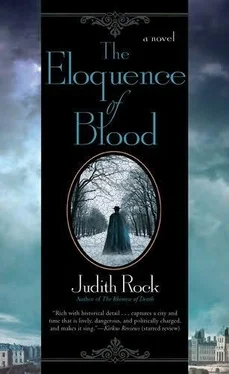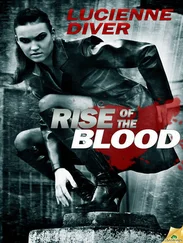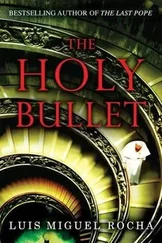Judith Rock - The Eloquence of Blood
Здесь есть возможность читать онлайн «Judith Rock - The Eloquence of Blood» весь текст электронной книги совершенно бесплатно (целиком полную версию без сокращений). В некоторых случаях можно слушать аудио, скачать через торрент в формате fb2 и присутствует краткое содержание. Жанр: Исторический детектив, на английском языке. Описание произведения, (предисловие) а так же отзывы посетителей доступны на портале библиотеки ЛибКат.
- Название:The Eloquence of Blood
- Автор:
- Жанр:
- Год:неизвестен
- ISBN:нет данных
- Рейтинг книги:5 / 5. Голосов: 1
-
Избранное:Добавить в избранное
- Отзывы:
-
Ваша оценка:
- 100
- 1
- 2
- 3
- 4
- 5
The Eloquence of Blood: краткое содержание, описание и аннотация
Предлагаем к чтению аннотацию, описание, краткое содержание или предисловие (зависит от того, что написал сам автор книги «The Eloquence of Blood»). Если вы не нашли необходимую информацию о книге — напишите в комментариях, мы постараемся отыскать её.
The Eloquence of Blood — читать онлайн бесплатно полную книгу (весь текст) целиком
Ниже представлен текст книги, разбитый по страницам. Система сохранения места последней прочитанной страницы, позволяет с удобством читать онлайн бесплатно книгу «The Eloquence of Blood», без необходимости каждый раз заново искать на чём Вы остановились. Поставьте закладку, и сможете в любой момент перейти на страницу, на которой закончили чтение.
Интервал:
Закладка:
“In winter, there is nowhere else. Was his Farce of Monks well received?”
By the end of Charles’s retelling, Jouvancy was laughing nearly as hard as the audience had.
“Ah, Maitre du Luc, I wish I had seen you chasing Frere Brunet with that clyster! I often wish we could risk more comedy here. But public comedy is such a vexed question.” He frowned and shook his head. “All comedy is a vexed question when one is dealing with young people.”
“Do you disapprove of comedy, then, mon pere?”
“Oh, in most cases, yes, I do! Because the young are so easily led astray, you understand. And so much comedy in public theatres is frankly scurrilous.” He looked furtively at the door and lowered his voice. “I must admit, though, that I dearly love some of Moliere’s pieces-I once saw the incomparable Gentilhomme and laughed myself silly at poor Monsieur Jourdain! Our little Moliere sometimes went too far, I admit,” Jouvancy said affectionately. The great playwright had once been a day student at Louis le Grand, back when he was only little Jacques Poquelin, the upholsterer’s son. “A genius, though. And cut off in his prime, poor man.”
Interested in Jouvancy’s opinion, Charles ventured, “Do you think, then, that the church is too severe on actors?”
“In truth, I do! Excommunicating them, as happens too often, only drives them farther away from virtue, yet as we prove regularly in our colleges, the theatre can be an excellent school for virtue. If only actors would use it as that, there is no reason they should be denied the sacraments any more than dancers-and the church certainly does not excommunicate dancers!”
Charles laughed a little cynically. “If it did, it would have to excommunicate half the nobility of France! Not to mention the king.”
“Well, Louis does not dance himself anymore, but yes. Speaking of dancers, who are you going to cast in the musical tragedy?”
“Walter Connor, I think. And Armand Beauclaire, who in spite of his directional difficulty is an excellent dancer.”
“But poor Maitre Beauchamps,” Jouvancy said, his lively face a mask of mendacious concern. “Do you want to be answerable for the results if our dear dancing master has, yet again, to teach Beauclaire the difference between right and left?” Pierre Beauchamps, probably the greatest dancing master alive, was dance director of the Paris Opera and also Louis le Grand’s ballet master. And an indispensable thorn in the rhetoric master’s side. “There might well be murder done, maitre!”
Murder. Charles winced, seeing in his mind the word scrawled on the college doors-innocent of the slander now after the lay brothers’ long and hardworking night. Unbidden, his mind also showed him Martine, lying dead as he’d last seen her. Jouvancy, oblivious, had risen to hunt along his bookshelf for something. He looked up as someone tapped at the door.
“Come!”
A lay brother stuck his head into the room. “Your pardon, mon pere. There’s a Monsieur Germain Morel to see Maitre du Luc.” He looked at Charles. “In the anteroom by the main doors.”
Startled, Charles looked at Jouvancy for permission to leave, wondering uneasily what Mlle Isabel Brion’s dancing master could want.
“Yes, yes, very well, go.” The rhetoric master sat down again, leafing through his leather-bound costume book. “We will talk again before all this madness starts.”
“Thank you, mon pere.” Charles rose. “Please tell Monsieur Morel I am coming,” he said to the lay brother, who withdrew and clattered down the stairs.
Charles left the chamber quietly and hurried down behind him. Before he reached the anteroom at the bottom of the curving stone staircase, Morel was bowing, words tumbling out of his mouth.
“Forgive me for troubling you, Maitre du Luc. But Mademoiselle Brion begged me to come.” Morel was sweating in spite of the cold and seemed hardly able to catch his breath. “Because-” He gulped air. “Monsieur Brion is dead!”
Charles stared in confusion. “Her brother? Or do you mean her father?”
“Monsieur Henri Brion. A sergent of police came to tell Mademoiselle Brion that her father had been found murdered!”
Charles tried to think past his surprise. Lying awake during the night, he’d wondered whether, for some unguessed-at reason, it was Henri Brion, and not his son, who had killed Martine and fled, which would explain why no one had seen him since her death was discovered. But if that was true, why would he be suddenly dead himself? “Who found him, Monsieur Morel? Where?”
“I don’t know who found him. His body was-is-in a ditch very near the rue Perdue. The ditch is behind some old houses near the Place Maubert. Can you go there with me, maitre? Isabel-Mademoiselle Brion, I mean-wants you to pray for him. And she says”-color rose in Morel’s face-“she says you will know what to do.”
“I am sure that you will know quite well what to do yourself,” Charles said diplomatically. “But of course I will come.” He gathered his cloak around him and led the way to the postern door, thinking irreverently that it would take a papal bull to keep him away.
When he and Morel reached the Place Maubert, Morel led the way across it and down the small street that ran past the Mynette garden’s side gate.
“This is a back way to Henri Brion’s own house,” Morel said. “I think he must have been on his way home when he was attacked.”
The small street crossed a larger one and became an alley between old timbered houses. At the mouth of the alley stood a huddle of talking, eager-faced women. Servants, most of them looked to be, but the one at the center of the group was a wood seller resting the legs of her heavy carrying frame on the ground. She nodded to Charles. “They said you’d be coming, mon pere. It’s down the alley, in the ditch.”
Charles thanked her, and he and Morel hurried between the houses to a snowy ditch that had perhaps once been a streambed and was ending its life as an illegal neighborhood midden. Two men stood in the ditch with their backs to the path. Charles didn’t know the man in workaday brown, but the one in the plumed hat and long black wig he knew all too well, even from behind.
Giving thanks for the cold for once, because it lessened the ditch’s stench, Charles picked his way down the snowy slope, Morel behind him. Morel arrived at the bottom with his dignity intact, but Charles stepped on something nastily soft under the snow and slid precipitously, saved from falling flat only by a long arm and a lace-cuffed iron grip.
“Bonjour, Maitre du Luc. I thought you might be arriving.” A spark of warmth flickered in Nicolas de La Reynie’s dark eyes, and a corner of his mouth turned up beneath the moustache arching like a gray half moon above his lips. La Reynie was not a young man. But he was a commanding presence, tall and strong and powerfully built.
“And I am glad to find you here, mon lieutenant-general,” Charles said. “And not only because you saved my poor bones, if not my dignity.”
He didn’t bother asking why La Reynie had been expecting him. Or why the lieutenant-general of the Paris police had come himself to stand in this noisome ditch. The man knew more than anyone except God about what happened in the city, and probably knew it faster. He would certainly know of Martine Mynette’s murder and no doubt knew quite well that Henri Brion had been her notary. And that the Mynette money would now come to the Society of Jesus. Pressed unwillingly into La Reynie’s service last summer, Charles had quickly learned that nothing was beneath the lieutenant-general’s attention.
The other corner of La Reynie’s mouth lifted. “Dignity? Oh, Jesuits have dignity to spare, I find. Though no more bones than the rest of us. And perhaps, just now, no more money? At least, not yet.”
Читать дальшеИнтервал:
Закладка:
Похожие книги на «The Eloquence of Blood»
Представляем Вашему вниманию похожие книги на «The Eloquence of Blood» списком для выбора. Мы отобрали схожую по названию и смыслу литературу в надежде предоставить читателям больше вариантов отыскать новые, интересные, ещё непрочитанные произведения.
Обсуждение, отзывы о книге «The Eloquence of Blood» и просто собственные мнения читателей. Оставьте ваши комментарии, напишите, что Вы думаете о произведении, его смысле или главных героях. Укажите что конкретно понравилось, а что нет, и почему Вы так считаете.












